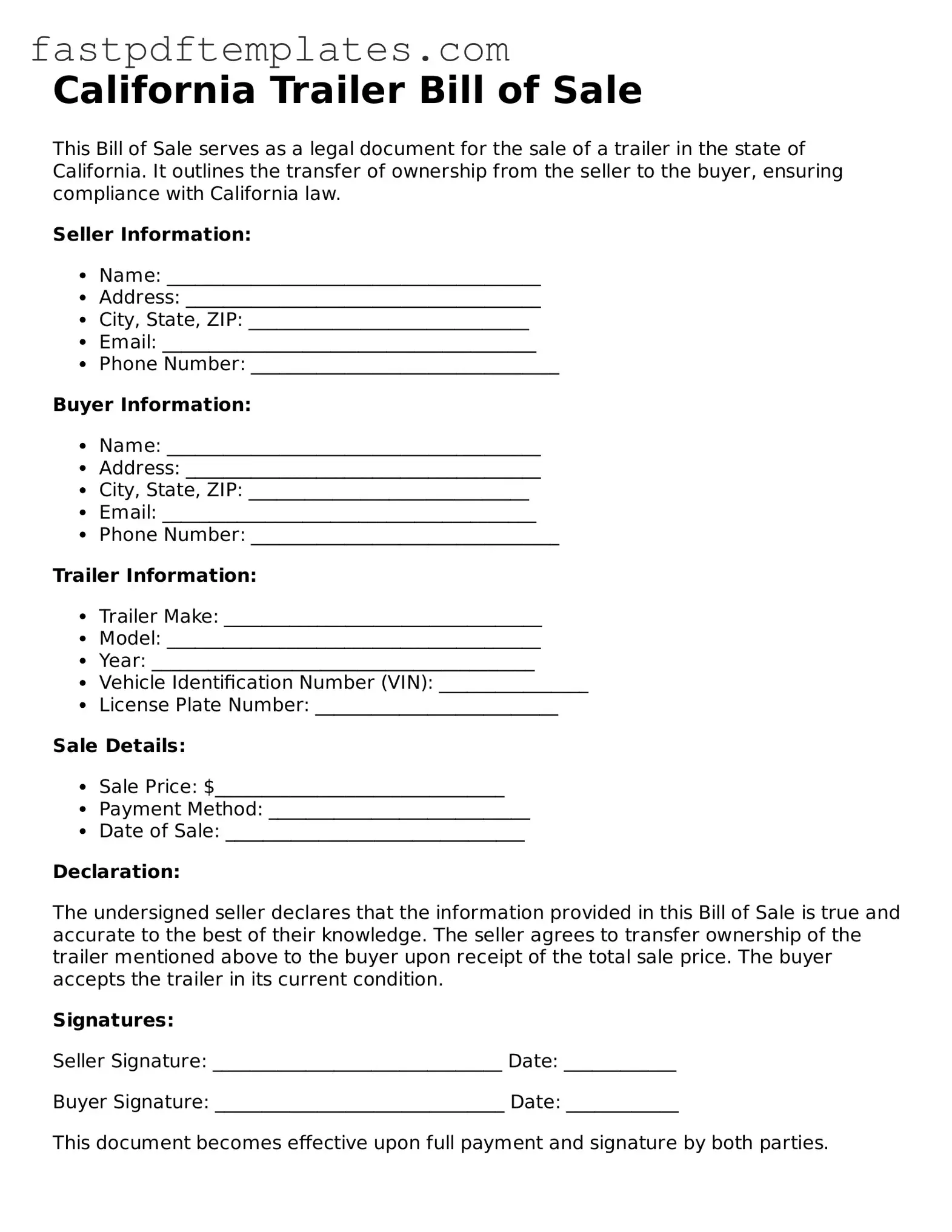The California Vehicle Bill of Sale is quite similar to the Trailer Bill of Sale. Both documents serve as proof of a transaction involving a vehicle or trailer. They outline essential details such as the buyer and seller's information, the vehicle's identification number, and the sale price. This document is crucial for registering the vehicle or trailer with the Department of Motor Vehicles (DMV) and provides legal protection for both parties involved in the sale.
Another related document is the Boat Bill of Sale. Like the Trailer Bill of Sale, this form is used to transfer ownership of a boat from one party to another. It includes similar details, such as the boat's make, model, and hull identification number, along with the buyer and seller's information. This document ensures that the transaction is recorded properly and can be used for registration purposes with the appropriate authorities.
The Motorcycle Bill of Sale also shares many characteristics with the Trailer Bill of Sale. This document is specifically designed for the sale of motorcycles and includes pertinent information such as the motorcycle's VIN, sale price, and the identities of the buyer and seller. Just like the Trailer Bill of Sale, it serves as proof of ownership transfer and is necessary for registration with the DMV.
The Mobile Home Bill of Sale is another similar document. When someone sells a mobile home, this bill of sale provides a record of the transaction. It contains details about the mobile home, including its serial number and the names of both the buyer and seller. This document is essential for ensuring that the new owner can register the mobile home and establish legal ownership.
The RV Bill of Sale is also comparable to the Trailer Bill of Sale. When purchasing a recreational vehicle, this document captures the details of the transaction, such as the RV's make, model, and VIN. It serves as a legal record of the sale, allowing the new owner to register the RV and proving that the transaction took place between the buyer and seller.
The Aircraft Bill of Sale is another document that shares similarities. This form is used when selling an aircraft and includes information about the aircraft's registration number, make, and model, as well as the buyer and seller's details. Like the Trailer Bill of Sale, it is essential for transferring ownership and is often required for registration with aviation authorities.
The Personal Property Bill of Sale can also be likened to the Trailer Bill of Sale. This document is used for the sale of various types of personal property, including trailers. It outlines the details of the transaction, such as the description of the item, sale price, and the identities of the parties involved. This bill of sale provides a clear record of ownership transfer, similar to the Trailer Bill of Sale.
In addition, the Farm Equipment Bill of Sale is relevant in this context. When selling farm equipment, this document is used to record the transaction. It includes details about the equipment, such as its make and model, along with the buyer and seller's information. This bill of sale serves as proof of ownership transfer, much like the Trailer Bill of Sale, and is essential for ensuring that the new owner can use the equipment legally.
Finally, the Lease Agreement can be compared to the Trailer Bill of Sale in certain aspects. While a lease agreement typically pertains to renting property, it may also include a purchase option at the end of the lease term. This document outlines the terms of the lease and any conditions for purchasing the property at a later date. In this way, both documents serve to establish ownership rights, albeit in different contexts.

